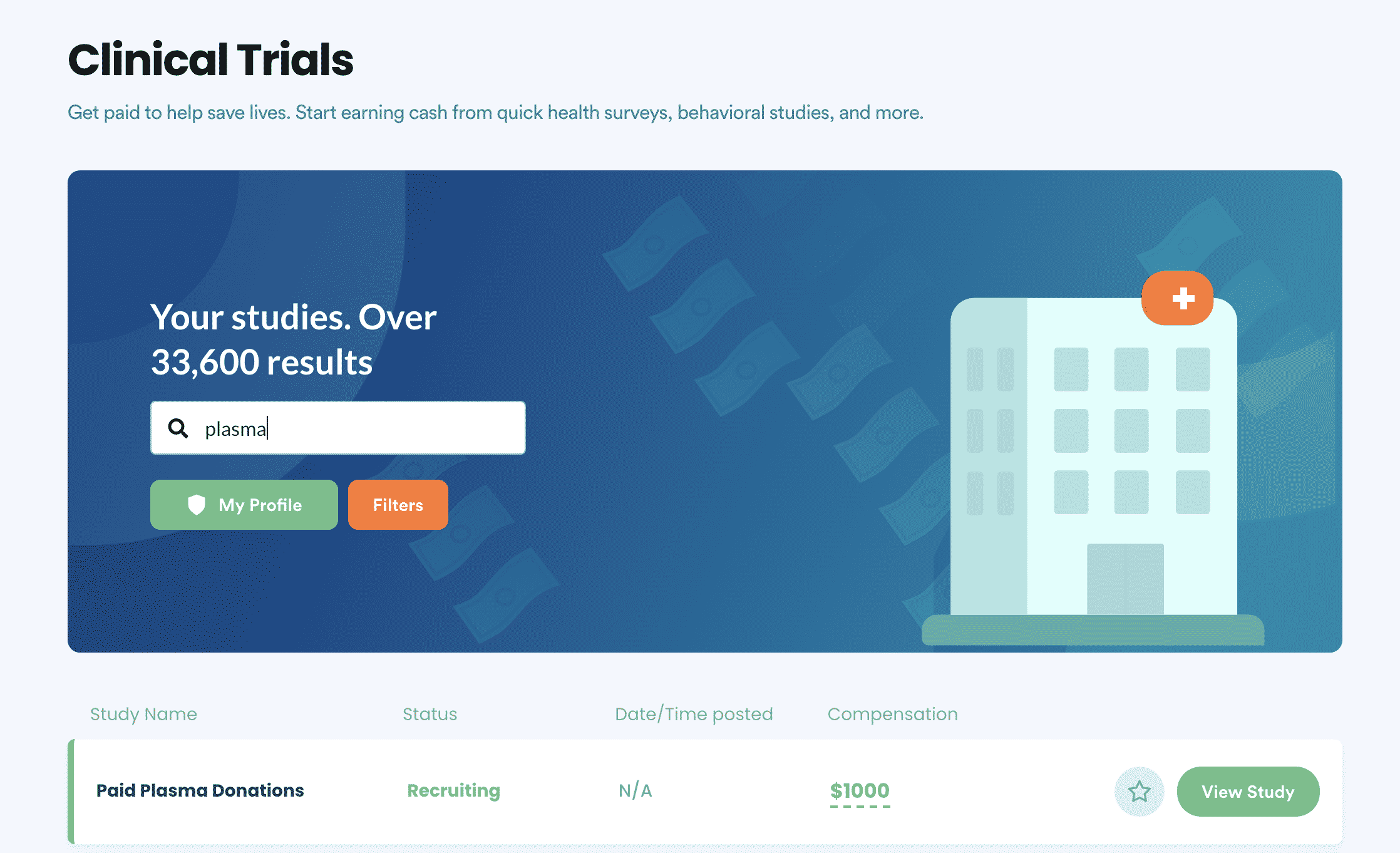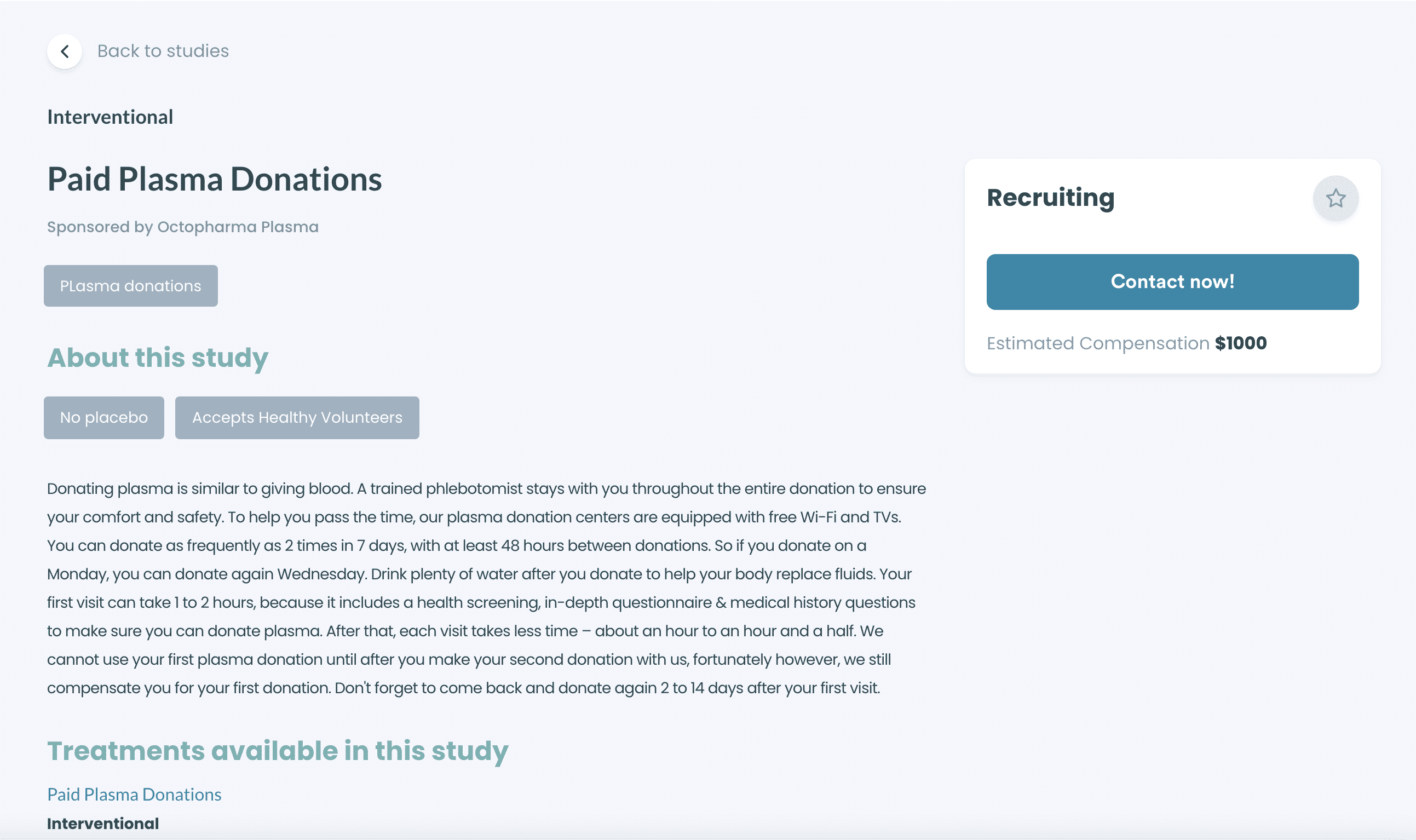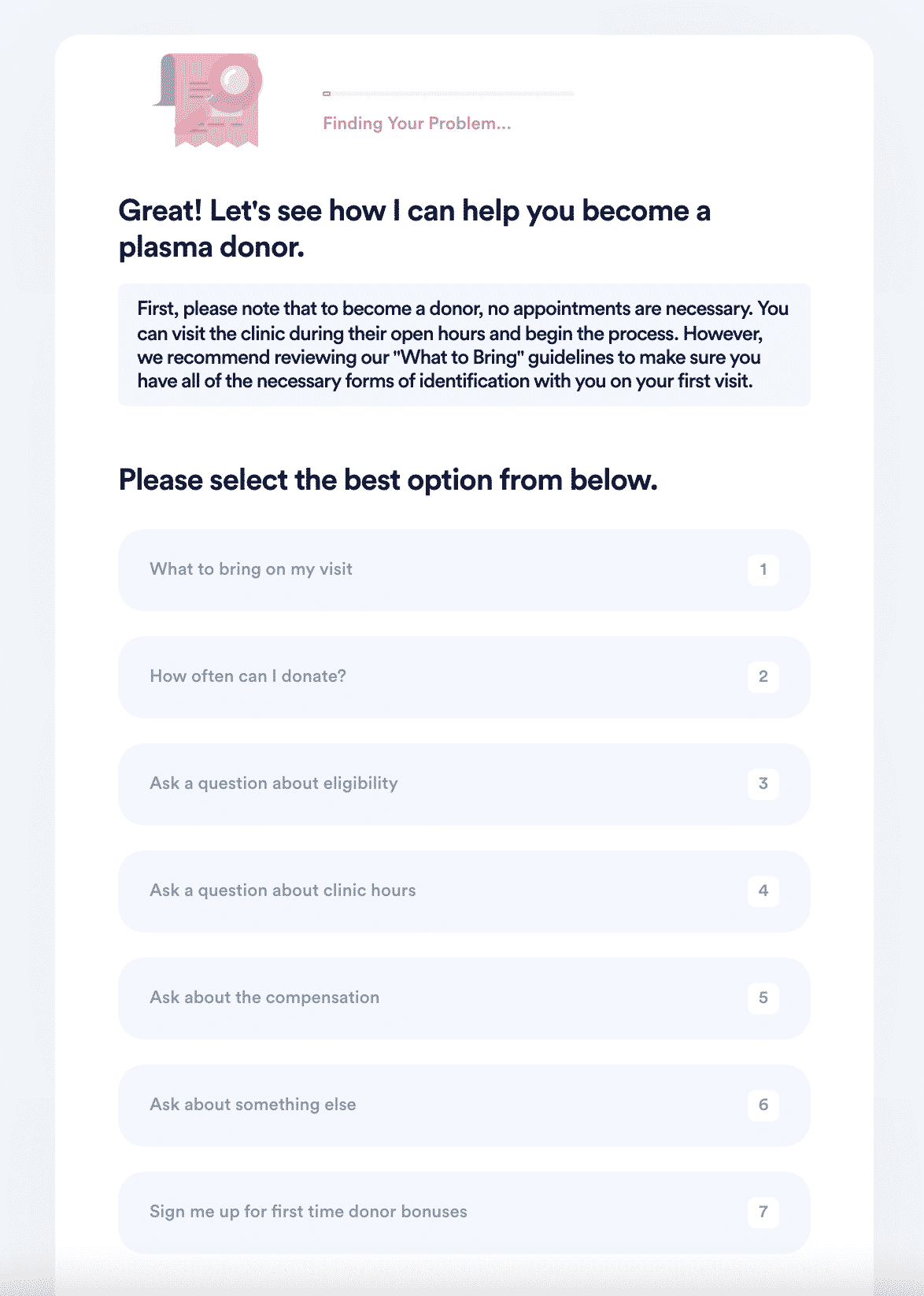How You Can Donate Plasma If You Are Anemic
Nowadays, it seems like everyone has a side hustle that puts a little extra cash in their pocket. For thousands of Americans, that extra cash—in some cases up to $1,000 a month—comes from regular donations of life-saving plasma through a certified Plasma Donation Center. Are you interested in earning plasma money while simultaneously providing the gift of life to patients in need? If so, you probably have a few questions first, like:
We can help you get the answers to these questions and more, especially if you're concerned that a medical condition like anemia might affect your eligibility. For example, while low iron levels in anemic individuals may make it more challenging to donate plasma, it doesn't necessarily exclude them from doing so. DoNotPay will not only find the best plasma sites near you and outline the donation process, but we can contact any donation site for more information about and anything else you need to know.
How Plasma Donation Works
Human blood is about 45% red blood cells, white blood cells, and platelets suspended in liquid. That remaining 55% liquid portion of the blood is called "plasma" which carries essential nutrients, proteins, and enzymes throughout the body, among other functions. Pharmaceutical companies use plasma in the creation of life-saving treatments for bleeding disorders and immune deficiencies, and the demand for plasma is high.
Plasma donation is a relatively safe process that draws blood from a donor and separates the plasma fluid from the blood cells with the help of a high-tech apheresis machine. This sterile system collects and stores the plasma and returns the remaining red blood cells to the donor's body along with saline to replace the donated fluid. Donors who are familiar with the process are in and out of the donation chair in about 45-60 minutes.
Plasma Donor Eligibility Requirements
Prospective plasma donors should be in good overall physical health. In part, this helps to ensure you'll easily withstand any potential side effects of the complicated donation process. The rigorous screening process also ensures that any medication made from your plasma is not compromised.
Regardless of where you choose to donate, eligibility requirements are fairly consistent:
- You must be at least 18 years old
- Donors should weigh at least 110 pounds (50 kilograms)
- Pass a medical evaluation and medical history screening
- Test non-reactive for transmissible viruses like hepatitis and HIV
- Provide valid ID and a permanent address
What Factors May Disqualify Me From Donating Plasma?
Every time you attempt to donate plasma, you'll be walked through a screening process that verifies your identity, confirms your medical history, and tests a blood sample before you're allowed to donate. There is a list of donor exclusion criteria that may disqualify you from donating, including:
- Illness, such as a fever or productive cough. Also, anyone currently on antibiotics.
- Certain Medical conditions, including HIV and hepatitis.
- Low iron, aka hemoglobin below qualifying levels.
- Certain treatments or medications that involve blood transfusions and surgeries.
- Travel, specifically if you have traveled to parts of the world dealing with infections like the Ebola or Zika virus.
You can find a full list of eligibility and exclusion criteria on the American Red Cross website. In the case of anemia and other chronic illnesses, you are not automatically banned from donating plasma. As long as you feel well, the condition is under control, and you meet all other plasma donation requirements, you can still qualify to donate.
What Is Anemia?
is a condition that affects the blood whereby you don't have enough healthy red blood cells to carry enough oxygen throughout your body. This can result in you feeling fatigued and weak. While there are different types of anemia, the most common versions are related to iron deficiency or vitamin deficiencies. This means that some treatments for anemia, like taking supplements and following a healthy diet, can manage or even prevent the condition.
Be sure to consult with your doctor if you are concerned about . Together you can review your medical history, monitor your blood tests, and agree on the safest way for you to donate plasma.
Can I Boost My Iron Levels if I’m Anemic?
While some types of anemia can't be prevented, you can still affect your iron deficiency by eating a diet rich in vitamins and minerals. If you've been turned away from donating plasma because of a low hemoglobin count, consider adjusting your diet in the following ways:
| Iron | Iron is a mineral that the body needs for growth and development, especially for hemoglobin. Add plenty of iron-rich foods to your diet, like beef, beans, lentils, dark green leafy vegetables, and dried fruit. |
| Folate | Nutrient-rich folate or folic acid assists the body in the creation of healthy red blood cells and is found in fruits and fruit juices, dark green leafy vegetables, green peas, kidney beans, and enriched grain products. |
| Vitamin B-12 | Also crucial in the production of red blood cells, B-12 can be found in foods like meat, dairy products, and fortified cereal and soy products. |
| Vitamin C | Known to increase your blood antioxidant levels by up to 30%, Vitamin C in the diet is a must! Foods rich in vitamin C include citrus fruits, peppers, broccoli, tomatoes, melons, and strawberries. |
How You Can Donate Plasma by Yourself If You Have Anemia
If you're ready to find the right plasma donation center that won't turn you away due to , you might have to do a bit of research first. You can try discovering a local center online through a website like Donatingplasma.org. Call ahead to ask any questions related to anemia that may affect your eligibility. Before your first visit, be sure to:
- Drink a lot of fluids to stay hydrated.
- Get enough sleep the night before.
- Avoid drinks such as caffeine, which can impact your pulse.
- Gather all necessary documentation needed.
It's wise to make an appointment ahead of time for your first visit, as the screening and donation process can take anywhere from 1-2 hours to complete.
How You Can Become a Plasma Donor With the Help of DoNotPay
Along with your natural concerns and questions surrounding anemia, there is a lot to learn about the process of becoming a successful plasma donor. Researching eligibility requirements and comparing various donation centers can be a tedious and time-consuming process. DoNotPay can provide you with these answers and more, including compensation estimates, so you're sure to find the best fit with the best possible payout. Use our Clinical Trials product before you donate plasma, so you know exactly what to expect, especially if you have a condition like anemia.
Here's how you can use DoNotPay to become a plasma donor:
- Search "plasma donations" on DoNotPay and find the nearest donation clinic through our clinical trials product.

- Select the "Contact Now" button to learn more about eligibility criteria, contact the clinic with questions, or sign up for first-time donor bonuses.

- Verify your information and submit your inquiry! DoNotPay will contact the clinic on your behalf and make sure your questions get answered.

DoNotPay Works Across All Plasma Donation Centers With the Click of a Button
Aside from helping you understand how to donate plasma, DoNotPay can answer more of your questions, like:
- Can diabetics donate plasma?
- Can you donate plasma after getting vaccinated for Covid?
We work across all companies to provide you with answers quickly, easily, and successfully!
What Else Can DoNotPay Do?
Believe it or not, DoNotPay is host to a huge array of useful products that can help you answer any question or tackle any problem. Here are just a few examples of what we can do:
- Cancel memberships or subscriptions
- Dispute unfair parking tickets
- Get help managing bills
- Arrange
- File an insurance claim
- Request sick leave
on our website and learn how DoNotPay can make your life easier in a hundred different ways!
 By
By